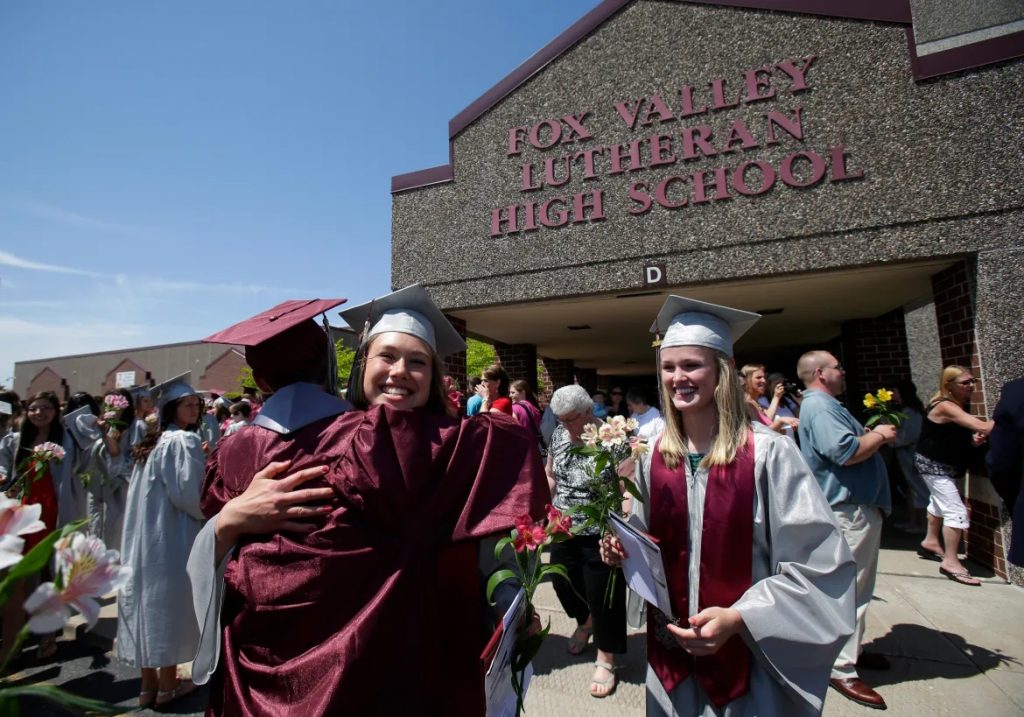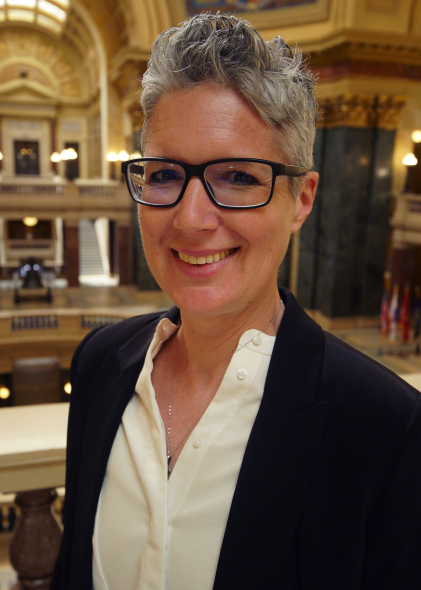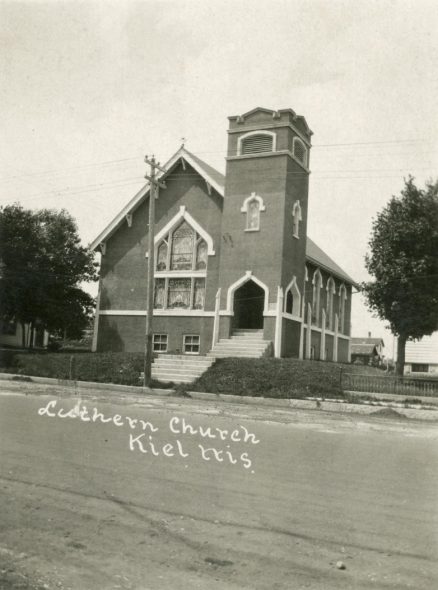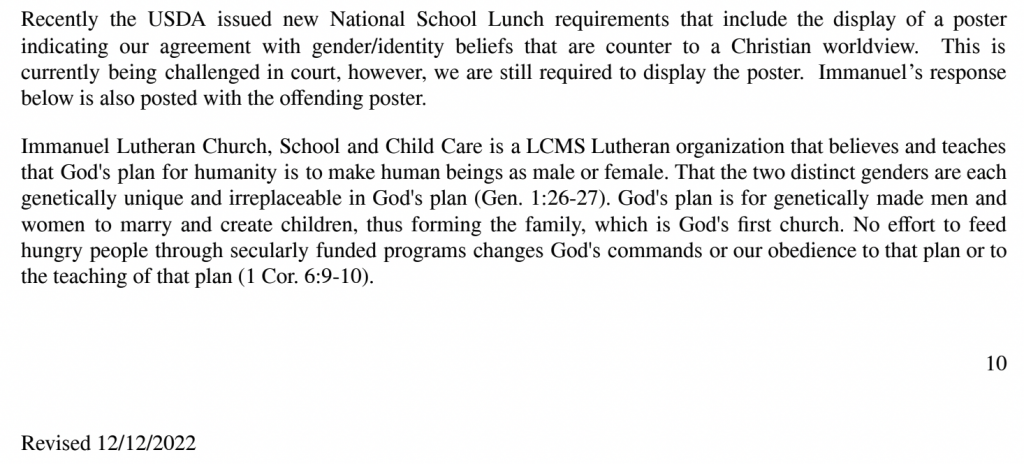Taxpayers Support Schools That Can Discriminate
Dozens of voucher schools have policies excluding LGBTQ+ and disabled students.

Taxpayer-funded vouchers make eligible families better able to afford a private school education, but students who are LGBTQ+ or have disabilities lose rights they would have in the public school system. (Amena Saleh / Wisconsin Watch)
This story was originally published by Wisconsin Watch.
Editor’s note: This story was updated Friday, May 5 by Wisconsin Watch to include additional response from School Choice Wisconsin.
In 2022, the two Fox Valley Lutheran High School students were a few months from graduating when they got called into the dean’s office.
One was the cheerleading captain and National Honor Society inductee; the other a basketball player, homecoming queen and student council member. Both were accomplished and well-respected students.
The school’s handbook states that “any sexual misconduct,” including “homosexual behavior… on or off campus, will be treated as a serious violation of God’s will and may be grounds for disciplinary action or expulsion.”
State law prohibits public schools from discriminating against students on the basis of sex, sexual orientation or disability, but it does not extend the same protections to private schools — even those receiving public funds.
Fox Valley Lutheran in Appleton is one of 373 of Wisconsin private schools that currently receive public funding through tuition vouchers. According to this year’s preliminary numbers, they serve more than 52,000 voucher students, which amounts to 6% of all students at Wisconsin publicly funded schools. About one-fifth of voucher schools have 90% or more of their students on vouchers, what one scholar describes as “private in name only.”
Wisconsin spent about $443 million this year on the four choice programs. Some Republicans, including 2022 gubernatorial candidate Tim Michels, have pushed for “universal” school choice, which would allow any Wisconsin student, regardless of income, to attend a private school at taxpayer expense.
The cheerleading captain, who spoke to Wisconsin Watch on the condition of anonymity to avoid harassment, recalled the dean saying he’d go easy on them because they were good students. The pair could remain enrolled and graduate, so long as they broke up and spoke with a pastor — and after he outed them to their parents.
Leaders from Fox Valley Lutheran did not respond to a request for comment on this account.
The next day, dozens of seniors quietly protested the decision by wearing their school-issued class T-shirts, which were tie-dyed rainbow. The next week, the young woman found herself meeting with the principal, athletic director and her parents.

In 2022, a sophomore at Fox Valley Lutheran High School asked Gov. Tony Evers’ office for help after two gay students were allegedly banned from sports for being in a relationship. The private school receives public funding through Wisconsin’s voucher, or “school choice,” programs. Fox Valley’s 2014 graduation ceremony in Appleton, Wis. is shown in this photo. (Dan Powers / Post-Crescent Media)
She suspected it was “retaliation after the whole rainbow shirt thing” because they’d believed breaking up, religious counseling and forced outing was the “extent” of their punishment.
The principal, Alan Nolte, began with a prayer that asked the “Heavenly Father” to bless the meeting as they “help to build (the student) up,” according to a recording of the meeting.
He said their relationship was a sin because “the Bible is clear,” but that the administration was treating it as any other code of conduct violation.
“Our chief concern,” Nolte said, “is your spiritual welfare.”
In an interview, the student said she did not mind a religious school instructing a student to meet with a pastor — but she objected to a taxpayer-funded school meting out punishment based on “moral issues.”
‘Little can be done’
The cheerleading captain didn’t know it, but another student had reached out on her and her girlfriend’s behalf, asking Gov. Tony Evers for help.
“This week two fantastic athletes, (REDACTED) and (REDACTED) were banned from all team sports for being in a homosexual relationship,” the student wrote in an online complaint. “The entire student body is very upset about this, as this could affect (their) careers in sports when it should not.”
The student said: “This is discrimination, and I believe it should be addressed on a government level, as the school receives funding from school choice.”
In an email to Wisconsin Watch, Fox Valley Lutheran’s president said the “details” of the complaint were “not accurate,” but he declined to say how.
Records show Evers’ staff sought guidance from the state Department of Public Instruction on how to respond, but acknowledged that “likely little can be done as it is a private institution.”
In response to questions from Evers’ staff, DPI said it lacked “apparent authority” to intervene on behalf of the student-athletes. It recommended the concerned student contact the school’s governing board or advocacy groups who might connect them with attorneys.
The first governor to raise the LGBTQ+ flag over Wisconsin’s capitol could not help the gay students. The young women pretended to break up and laid low until graduation. They’re still dating today.
‘Choice’ for some, not all

Wisconsin Department of Public Instruction Communications Director Abigail Swetz called the current legal landscape “unfortunate” because it permits private schools taking public funding to discriminate against LGBTQ+ or disabled students. (Courtesy of Wisconsin Department of Public Instruction)
Wisconsin is considered the birthplace of the “school choice” movement. The nation’s first publicly funded private voucher program began in Milwaukee in 1990. Initial restrictions, such as limiting vouchers to secular schools, have disappeared as the program has expanded. Today, 32 schools — including at least one with an anti-LGBTQ+ stance — have their entire student bodies on publicly funded vouchers.
Legal discrimination against students who are LGBTQ+ or have disabilities results from a lack of state-level protections; a federal exemption that allows religious entities to discriminate against LGBTQ+ students and another that requires schools taking federal funds to make only minor adjustments for students with disabilities; and a state education agency constrained by punctilious rules and decades of litigation.
“It’s unfortunate,” DPI communications director Abigail Swetz told Wisconsin Watch by email. “We want children to be included, welcomed, and safe in all schools, especially those that receive public funding. It is what we expect as good stewards of public dollars and as educators who value all children.”
The president of School Choice Wisconsin, Nicholas Kelly, said by email that his organization “support(s) and encourage(s) compliance with all rules and processes set in place to address issues of this nature.” He did not respond to specific questions.
After publication, Kelly disputed that private schools discriminate. He provided a statement that read, in part, “Fundamentally, parental choice and educational freedom provide accountability. If parents or students are not satisfied with the education they receive they can choose another school.”
Wisconsin Watch reviewed public materials for about one-third of the state’s voucher schools and found that nearly half had policies or statements that appeared to discriminate against students who are LGBTQ+ or have disabilities, often citing religious principles or lack of capacity to accommodate certain conditions.
Some handbooks say administrators may decline to enroll students with disabilities whose needs they cannot meet. Others say they might refuse enrollment to students whose families support LGBTQ+ people. Some, like Fox Valley Lutheran, might expel students who engage in “homosexual behavior” off campus. One will even expel students if their parents’ conduct is “contrary to the Bible.”
“Let’s just stop calling it a ‘choice program,’ ” said Jeffrey Spitzer-Resnick, a civil rights attorney and disability education advocate. “And let’s call it a private discriminatory education program funded with your tax dollars.”

Professor Suzanne Eckes teaches education law, policy and practice at the School of Education at the University of Wisconsin-Madison. She thinks it’s “common sense” that schools receiving “taxpayer money shouldn’t be able to discriminate against certain historically marginalized students.” (Courtesy of University of Wisconsin-Madison)
Several other organizations that support voucher schools ignored repeated requests for comment.
Every voucher school contacted ignored or declined an interview to clarify its positions, as did every association, church or accreditor representing them. Some provided brief, written statements. Two hung up on calls, and one blocked a reporter’s emails.
In records obtained from DPI, a Wisconsin Evangelical Lutheran Synod pastor said he believes “that lifestyles and current viewpoints of LGBTQ individuals clearly oppose the teachings of Scripture and therefore constitute sin that must be addressed. … Within our circles, we would say that ‘this is not discrimination but rather love practiced in the same way a parent would raise a child and announce harm when it is near.’ ”
Legal scholars and advocates for the LGBTQ+ and disability communities all objected to public dollars supporting institutions with such policies.
“I think it’s a common sense approach — and that the general public would typically agree — that a school that receives taxpayer money shouldn’t be able to discriminate against certain historically marginalized students,” said Suzanne Eckes, an education law professor at University of Wisconsin-Madison.
“LGBTQ folks are members of the community, we’re taxpayers,” said Ali Muldrow, a Madison School Board member and co-executive director of GSAFE, which advocates on behalf of LGBTQ+ youth in education. “We shouldn’t have to contribute to entities and institutions that discriminate against us.”
‘Am I allowed to expel a student who comes out of the closet?’
Wisconsin lawmakers have declined at least three times to stop voucher schools from discriminating against LGBTQ+ students or those with disabilities. Proposals in 2007, 2013 and 2015 all died without public hearings. Leaders of the education committees in both chambers did not respond to emails from Wisconsin Watch asking if they condone the status quo.

In 2020, Rev. Brett Naumann, pastor of Trinity Lutheran Church in Kiel, emailed the state Department of Public Instruction with questions related to the treatment of gay and transgender students if his school joined the voucher program. A postcard of Trinity Lutheran Church shortly after it was completed in 1918. (Image courtesy of the Heritage Collection at Kiel Public Library)
Establishment of all four of the state’s voucher programs — the Milwaukee, Racine and statewide Wisconsin Parental Choice Programs and the Special Needs Scholarship Program — was tucked into larger budget bills and signed by Republican Govs. Tommy Thompson and Scott Walker.
State law requires voucher schools to comply with a federal code prohibiting discrimination based on race, color or national origin, but no other protected classes. And while they cannot discriminate against LGBTQ+ students or those with disabilities during admissions — limited by statutorily described eligibility criteria — they may do so once that student is enrolled.
It is even legal for a private school to enroll a voucher student “one minute” and expel them “the next,” confirmed Swetz.
Over the years, records show, faith leaders considering joining the voucher program have inquired about this distinction in blunt terms.
The Rev. Brett Naumann, pastor of Trinity Lutheran Church in Kiel, asked if he could expel a student who came out as gay or transgender, “provided that it is clearly laid out in our handbook.” A DPI consultant responded: “Once a student has been offered a seat and the student accepts, school policies apply.”
Naumann’s school is not currently a member of the voucher program, and he referred all questions to the Wisconsin Evangelical Lutheran Synod (WELS), whose spokesperson, Lee Hitter, did not answer specific questions.
He provided a statement that said, in part: “We operate our schools in accordance with all state and federal laws… Prospective families can determine if the mission and beliefs of WELS schools meet the needs of their families and whether to enroll their children.”

An excerpt from a 2020 email sent to the Wisconsin Department of Public Instruction, obtained through open records, shows that Trinity Lutheran’s Rev. Brett Naumann asked the agency if, upon joining the voucher program, he could expel students who came out as gay or transgender. DPI responded it is legal under state law. (Screenshot of an email from Pastor Brett Naumann to Department of Public Instruction)
WELS considers it a sin to be transgender or gay. Wisconsin Watch found 17 WELS schools participating in the voucher program with anti-LGBTQ+ policies.
Enrollment required; expulsion OK
DPI’s authority to protect students who are LGBTQ+ or have disabilities at voucher schools stops at enrollment.
The official complied, adding a disclaimer that exempted voucher students from this anti-LGBTQ+ admissions requirement, while maintaining it for privately paying students — a distinction Wisconsin Watch found elsewhere.
As permitted by law, Fond du Lac Christian School kept in its 2017-18 handbook an eight-point anti-LGBTQ+ policy against enrolled students, as well as parents, employees and members, which bans them from “practicing” their gay or transgender identities.
Today, about 63% of Fond du Lac Christian School’s students are on vouchers. The current handbook is not publicly available, and school administrator Luke Wagner and other staff blocked a reporter from emailing them after asking for the policy. A receptionist hung up on the same reporter when inquiring by phone.
A ‘cautious’ DPI
DPI risks a lawsuit if its response to claims of discrimination appears to overstep its authority as explicitly described in statute. And a lawsuit, DPI’s Swetz said by email, could create “bad law (court precedent) that would further harm kids.”
DPI also can’t establish rules granting itself additional authority without agreement from the Republican-controlled Legislature.
In the 1990s, at the beginning of the state’s first voucher program, then-State Superintendent of Public Instruction Bert Grover crafted a rule requiring participating private schools to serve students with disabilities similarly to public schools. But it was short lived, with a judge deciding Grover lacked the authority to establish such a rule.
And even after the U.S. Department of Justice ordered DPI in 2013 to end discrimination based on disability in its voucher school program, the agency said it lacked the specific statutory authority to act.
“There is this long-standing pattern in the space of courts and the Legislature of looking for ways to limit DPI’s authority,” said Elisabeth Lambert, attorney and founder of the Wisconsin Education Law and Policy Hub. “All (DPI) can do is apply these very specific procedural mandates that are written into the statute, and there’s no authority outside that.”
This history has made DPI, in Lambert’s view, “cautious” and “defensive.” Spitzer-Resnick, the other education attorney, has a blunter description: “completely wimpy.”
“We have to be cautious,” Swetz said. “When it comes to the private school choice programs, we so much as sneeze, and we get sued, and then more kids get hurt.”
‘We operate under what is written in state statutes’
DPI declined to weigh in even when presented with possible violations of state law uncovered by Wisconsin Watch.
Faith Christian School in Williams Bay, which has 17% of its student body on vouchers, requires all families to undergo the school’s admissions process, including providing a “Christian testimony” from one parent, a student/family interview and agreement with the school’s anti-LGBTQ+ and anti-abortion statement of faith.
Faith Christian School also vows to leave the voucher program if the state dictates it cannot make enrollment or admissions decisions “based solely on a student’s views or behavior related to … homosexuality; gender; and sexual identity, including the student’s own gender identification.” State law already prohibits that.
Peace Lutheran School in Hartford has a similar application process to Faith Christian, requiring parents to “permit their child to be instructed in the doctrines of Holy Scripture,” as taught by the Wisconsin Evangelical Lutheran Synod, including “biblical truths” about “homosexuality, same-sex marriage, evolution, pre-marital sex, drug abuse, and the like.”
State law specifically requires voucher schools to honor a voucher family’s request to opt out of religious activities and instruction.
Swetz, DPI’s communications director, said whether Faith Christian’s approach or similar approaches violate state law comes down to timing.
“If these policies are applied as part of reviewing the student’s Choice eligibility and before the random selection process for the program, then it would be considered a violation,” she said by email. But if it came after the random lottery, it was fine.
Added Swetz: “Wisconsin DPI cannot weigh in on whether certain school’s policies are legal or illegal because we operate under what is written in state statutes.”
Faith Christian School did not respond to emails or phone messages. But a spokesperson for Association of Christian Schools International, which provides its accreditation, said “it is not discrimination for Christian schools to teach and live out the truths of the historic Christian faith with respect to marriage and human sexuality.”
Federal disability protections limited
Federal law ostensibly provides protections to students with disabilities, but various exemptions limit the effect.
Education legal scholars, lawyers and disability rights activists say that ultimately, when students with disabilities opt out of public school, they waive their most robust protections to an equal education.
Religious schools — nearly all of those receiving Wisconsin vouchers — are exempt from federal laws barring discrimination based on disability unless they take federal funds, and even then, the law requires only “minor adjustments.”
Fond du Lac Christian School, for example, states it “desires to serve” those it is “equipped to accommodate,” but “is not qualified to adequately address all learning disabilities, behavioral disorders or emotional disturbances.” Like Prairie Hill Waldorf School, it reserves the right to expel students if it determines the school cannot meet their needs.
Joanne Juhnke, an advocacy specialist at Disability Rights Wisconsin, said her organization “fairly regularly” receives calls from parents asking, “ ‘Oh my goodness, can they actually do this?’ ”
Even parents who enrolled their children on Special Needs Scholarship Program vouchers, which lists the rights of students with disabilities in the program compared to public schools, can feel blindsided.
“If you have any memory left of that plain black-and-white document that said you’ve given up some of your rights, it can still come as a surprise to you,” Juhnke said.
How Title IX protects religious freedom, allows LGBTQ+ discrimination
When it comes to LGBTQ+ protections, private religious institutions that receive federal funding are exempt from Title IX, the federal law barring gender-based discrimination in education, if complying with the law would violate a school’s religious tenets. This year, 95% of the state’s voucher schools are religious, Wisconsin Watch found.
Immanuel Lutheran School of Brookfield, which has 71% of its students on vouchers, embodies the exemption. Its handbook tells families that to receive federally subsidized free and reduced lunch, it must display a poster professing it does not discriminate on the basis of gender identity or sexual orientation.
But alongside what they call the “offending poster” is one reaffirming the school’s Christian beliefs that it is a sin to be gay or trans. Elsewhere, the school’s handbook warns that pupils should not “intentionally present their physical features or dress to be opposite his/her sex at conception.”

A screenshot from the handbook of Immanuel Lutheran School in Brookfield, Wis. shows that the private school, which has 71% of its students on taxpayer-funded vouchers, displays a poster countering an anti-discrimination statement from the U.S. Department of Agriculture, which funds free and reduced lunch at the school. (Screenshot from Immanuel Brookfield’s handbook)
The basis of a religious exemption to non-discrimination laws has a fraught history. Scholars Suzanne Eckes and Julie Mead write that in the mid-20th century, segregationists attempted to use the theory of “sincerely held religious beliefs” to justify exclusion of Black students. In 1983, the Supreme Court determined private religious schools cannot justify discrimination through faith and still claim public benefits, such as an IRS tax exemption.
Today, Eckes and Mead believe the question has moved to LGBTQ+ students. There’s a potential for litigation challenging Title IX’s religious exemption to LGBTQ+ discrimination, “in the same way that we saw in the ‘50s, ‘60s, all the way up through the early ‘80s of African-American students who weren’t being admitted to private schools,” Eckes said.
Mead argues that despite the various obstacles DPI faces, Wisconsin has a legal obligation to prevent discrimination within the voucher programs because they are public, state-administered programs.
Mead and Eckes have proposed passing state and federal laws prohibiting private schools taking public funds from discriminating against students who are LGBTQ+ or have disabilities.
But how that might stand against Title IX’s religious exemption is unclear. As of 2021, Maryland was the nation’s only state to ban discrimination based on sexual orientation or gender identity in voucher schools. It is currently defending its position in court.
The nonprofit Wisconsin Watch (www.WisconsinWatch.org) collaborates with WPR, PBS Wisconsin, other news media and the University of Wisconsin-Madison School of Journalism and Mass Communication. All works created, published, posted or disseminated by Wisconsin Watch do not necessarily reflect the views or opinions of UW-Madison or any of its affiliates.
If you think stories like this are important, become a member of Urban Milwaukee and help support real, independent journalism. Plus you get some cool added benefits.
-
Legislators Agree on Postpartum Medicaid Expansion
 Jan 22nd, 2025 by Hallie Claflin
Jan 22nd, 2025 by Hallie Claflin
-
Inferior Care Feared As Counties Privatize Nursing Homes
 Dec 15th, 2024 by Addie Costello
Dec 15th, 2024 by Addie Costello
-
Wisconsin Lacks Clear System for Tracking Police Caught Lying
 May 9th, 2024 by Jacob Resneck
May 9th, 2024 by Jacob Resneck






















There is no reason the Wisconsin Supreme Court should not reexamine the 4-2 decision in
Jackson v. Benson, 218 Wis.2d 835, 578 N.W.2d 602 (1998). The WSC ruled the school choice scam was okay as long as it did not: (1) have a secular legislative purpose;(2) its principal or primary effect neither advances nor inhibits religion; and (3) it does not create excessive entanglement between government and religion. If fails all three prongs of the test. One is enough to kill this outrageous program. If they can “reexamine” Roe v Wade, then we can look at how taxing people to prop up private businesses that discriminate, indoctrinate people with toxic religious thought and come to a conclusion. Maybe the same, maybe different. Only one member of that 1998 court is still there – and she did not participate in Jackson.
Just imagine if our tax money went to public schools and not private schools.
We MIGHT just have an actual education system then.
When I was growing up, my parents and the church community saw it as their responsibility to provide a religious education. We were part of a faith based community with shared beliefs and expectations for involvement. Now church communities are compromising their beliefs by admitting students who are not part of and have no commitment to their faith community. These admissions undermine the faith doctrine and lead to a diluting of the religious beliefs of the church community. In some congregations involvement in the choice program can make be a Republican a matter of faith. I think this is the point of the school choice program. It has never been about giving urban children options in education.
Policies regarding conduct in publicly funded schools, particularly conduct that infringes on sincerely held beliefs based on the Bible should be governed by federal and state law, not by interpretations of the Bible with whom others equally sincerely disagree. And both the school policies and the laws should be based on science and the anti-establishment provisions of the Constitution. I am a product of a religious school primary education in the days before vouchers. My parents assumed that the school tuition was a price to be paid to get the religious education they wanted their children to have. Other parents chose the public schools but provided the religious instruction at home and by involvement in the church. These difficulties are proving that the voucher program was a mistake. They show the unfortunate tendency to use laws, courts, and elections to build coercively a Bible-based society because we have lost faith in our ability to persuade others of the Bible based realities that seems so obvious to those who use them. That is using laws to enforce conversion much like Constantine used the sword